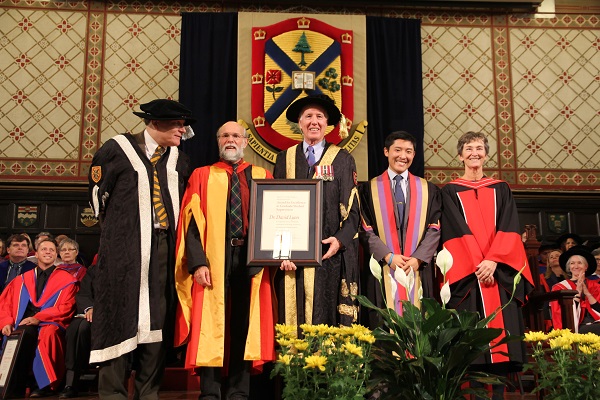Faculty members honoured for excellence in graduate student supervision
November 17, 2017
Share
During graduate research work, having a supportive supervisor is critical. The relationship between student and supervisor sets research in motion and keeps it on the right track. A strong relationship is important to a graduate student’s success and well-being.
The School of Graduate Studies annually recognizes two leading graduate supervisors with the Awards for Excellence in Graduate Student Supervision. The 2017 recipients include Dr. David Lyon (Sociology) and Dr. Suning Wang (Chemistry). Dr. John Freeman (Education) was also recognized posthumously with an Honourable Mention, calling attention to his role as a gifted supervisor who had a major and lasting impact on his students both in their personal and professional lives.
“The School of Graduate Studies congratulates these outstanding educators and thanks them for their leadership, mentorship, and contributions to enriching the academic experience of their graduate students,” says Brenda Brouwer, Vice-Provost and Dean of the School of Graduate Studies. “Mentoring and guiding graduate students throughout their studies is a tremendous responsibility and privilege. Drs. Lyon and Wang are role models who demonstrate how impactful quality supervision is in the lives of our students.”
Learn more about this year’s recipients:

David Lyon
Director of the Surveillance Studies Centre and Professor of Sociology and Professor of Law, David Lyon has supervised 28 graduate students to completion, each of whom has benefited from his full commitment and support. His students come from around the world, and the international mix of supervisees highlights his profile as an award-winning, international scholar with tremendous impact.
Under his supervision, students enjoy being able to learn and socialize with others from different backgrounds, life-experiences, and educational training. Dr. Lyon provides his students with opportunities to meet other international scholars, present their work at high profile conferences, and feel at home within a global community of researchers.
Dr. Lyon is praised by current and past students for challenging them academically as well as helping them grow as individuals. His students value the strong personal and scholarly bonds they have formed with him; while they rely on his expertise and scholarly advice, they also share time in conversation, exploring everything from the simple problems of everyday life to profound philosophical issues. Dr. Lyon’s students have excelled in their academic endeavours, and his students have gone on to successful careers around the world in academic and non-academic settings.
Suning Wang
Professor of Chemistry at Queen’s since 1996 and currently University Research Chair, Dr. Wang has supervised 13 MSc and 24 PhD students, as well as 18 postdoctoral fellows. The calibre of her supervision and mentorship is evident in the success of her graduate students in winning prestigious academic prizes, fellowships, and their success in faculty positions, and research careers in industry and government laboratories.
Dr. Wang’s students credit her with supporting life-changing personal growth, stemming from her care and concern for each student as an individual. She challenges her students to think critically about science, ask difficult and important questions, ethically communicate scientific findings, and continually grow as researchers. Dr. Wang is always available to her students and helps them stay on track, but she lets them make mistakes so that they gain a sense of ownership over their projects. Beyond encouraging and supporting her students in writing manuscripts for publication, preparing conference presentations, learning new techniques, and interacting with an international community of scholars, she never loses sight of the fact that they are people living complicated lives.
Dr. Wang makes an effort to get to know each of her students individually and is deeply invested in their success. She shares her own curiosity and passion for academic research while also respecting and accepting students’ individual ambitions. In the words of one of her students, “it is this combination of personal and professional investment in her students as individuals that makes Dr. Wang a truly exceptional graduate supervisor.”
Dr. Wang will be recognized and presented with her award at Spring Convocation 2018.
About The Award for Excellence in Graduate Student Supervision
This annual award recognizes those outstanding supervisors who demonstrate excellence in advising, monitoring and mentoring their graduate students. Excellence is judged on the quality of supervision and mentorship in facilitating the acquisition of skills and resources needed for the student to succeed as scholars and professionals. Characteristics include availability, timeliness and quality of guidance and feedback, responsiveness to student needs, and enthusiasm for the pursuit of knowledge. In addition, the supervisor must promote timely completion of the thesis and encourage the career development of the student through the provision of leadership and support in academic matters such as publishing, presenting, and applying for funding.
Preference is given to faculty members who have displayed sustained mentorship activity over many years.
Nominations open in February, and awards are presented at Convocation.